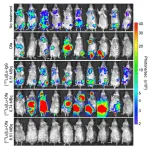(Press-News.org) As announced today in a press release by biotechnology company Treventis, global pharmaceutical company Takeda has agreed to exclusively license a group of small molecules that target tau – a protein in which misfolding and aggregation are believed to be a cause of Alzheimer’s disease.
The molecules were developed by the team at Treventis, building upon the Alzheimer’s & neurodegenerative research expertise of Dr. Donald Weaver’s lab at UHN.
“There are currently no effective drugs out there that target tau in the brain,” says Dr. Donald Weaver, Senior Scientist at Krembil Brain Institute, Professor at the University of Toronto and Chief Medical Officer at Treventis. “This has the potential to be such an agent.”
Current medications for Alzheimer’s are biologics, which means they have to be injected or delivered by infusion, invasively. A small molecule could more effectively be developed into a pill or capsule, to be taken orally.
“Small molecules are the Holy Grail,” says Dr. Marcia Taylor, Vice President of Research at Treventis.
“Much research and funding has gone toward amyloid beta (Aβ) as a therapeutic target. We’ve shown that Aβ misfolding and aggregation may be happening for 20 years, but it’s only when tau starts to misfold and bunch up that the first symptoms of Alzheimer’s appear.”
“It’s now appreciated that tau misfolding and clumping is the trigger that brings forward the symptoms. That’s when the person says, ‘Something’s wrong. My memory is not what it should be. My cognition is not what it should be,” says Dr. Weaver.
“Now that this sort of information is in hand, we can actually use that insightfully in the design of therapies.”
Researchers at Treventis developed a proprietary platform technology called Common Conformational Morphology (CCM) which uses computer-aided modeling to design molecules that can prevent the pathogenic misfolding of a number of different proteins at the earliest stages. One of the group’s lead projects is targeting tau.
“We use this model to design molecules and then we optimize them for safety and target engagement, demonstrating that we can reduce the portion of tau that causes pathogenicity, at the earliest stages of disease,” says Dr. Taylor.
The researchers have also been able to incorporate features into this molecule to ensure that it crosses the blood brain barrier, a complex cell-based system made up of blood vessels and tissue that helps to prevent toxic substances from reaching the brain.
“We used new computational models developed by Dr Weaver’s group to design compounds that not only penetrate the brain but have the required safety profile to become a drug," says Dr Mark Reed, Chief Scientific Officer at Treventis, and Staff Scientist at UHN. “This has proven a painstaking, but highly effective strategy.”
Coming up with innovative approaches and new therapeutic targets for Alzheimer’s disease has proven incredible elusive and challenging for many research teams worldwide.
“It has taken us 15 years and a lot of failures to come up with this class of small molecules,” says Dr. Weaver. “Most drug discovery programs don’t have that kind of patience. Most small biotech companies don’t have the survivability. It’s thanks to the flexibility and ingenuity of all the people involved that Treventis has had the time, and the runway, to make this possible.”
“We have actually been on the right track the whole time but the technology to be able to test our hypothesis has only just caught up,” adds Dr. Taylor.
Alzheimer’s is just one example of a disease that involves misfolding proteins. Researchers hope the CCM platform technology could lead to a better understanding of how proteins misfold in other diseases, such as Parkinson’s, Amyotrophic lateral sclerosis (ALS) and cancer.
“I always say that global diseases such as Alzheimer’s deserve a global solution,” says Dr. Weaver. “Well, only small molecules that can be developed into therapeutics are a global solution.”
About the Krembil Brain Institute
The Krembil Brain Institute at Toronto Western Hospital, part of University Health Network, is home to one of the world’s largest and most comprehensive teams of physicians and scientists uniquely working hand-in-hand to prevent and confront problems of the brain and spine. One in three Canadians will experience a brain-related condition such as Parkinson’s, Alzheimer’s or epilepsy in their lifetime. Through state-of-the-art patient care and advanced research, we are working relentlessly to find new treatments and cures. For more information: https://www.uhn.ca/krembil
About University Health Network
University Health Network consists of Toronto General and Toronto Western Hospitals, the Princess Margaret Cancer Centre, Toronto Rehabilitation Institute, and The Michener Institute of Education at UHN. The scope of research and complexity of cases at University Health Network has made it a national and international source for discovery, education and patient care. It has the largest hospital-based research program in Canada, with major research in cardiology, transplantation, neurosciences, oncology, surgical innovation, infectious diseases, genomic medicine and rehabilitation medicine. University Health Network is a research hospital affiliated with the University of Toronto. For more information: https://www.uhn.ca/
MEDIA CONTACT:
Heather Sherman
Communications Manager, Krembil Brain Institute/UHN
Heather.Sherman@uhn.ca
END
Takeda licenses small molecule developed by Krembil Brain Institute researchers, targeting tau protein implicated in Alzheimer’s disease
Global pharmaceutical company Takeda has agreed to exclusively license a group of small molecules that target tau – a protein in which misfolding and aggregation are believed to be a cause of Alzheimer’s disease
2023-04-11
ELSE PRESS RELEASES FROM THIS DATE:
Mount Sinai researchers discover novel receptors for SARS-CoV-2 and their age-dependent expression, providing new insights for public health
2023-04-11
New York, NY (April 11, 2023) – A study led by Mount Sinai researchers Dr. Bin Zhang, the Willard T.C. Johnson Research Professor of Neurogenetics, and Dr. Christian Forst, an Associate Professor in the Department of Genetics and Genomic Sciences, have identified potential novel receptors for SARS-CoV-2 and unveiled their tissue-specific and age-dependent expression. The findings were published on March 23 in the Federation of European Biochemical Societies Letters.
The study's multiscale network analysis suggests that SARS-CoV-2 utilizes multiple novel receptors, such as the TYOBP receptor CD300e, to facilitate ...
Perfume component helps lure male moth pests
2023-04-11
North Carolina State University researchers have shown that adding a small amount of a chemical used in perfumes – nonanal – to a two-chemical combination of other sex pheromones helped increase the cocktail’s effectiveness in mimicking female fall armyworm “come hither” calls to males.
The findings could eventually help farmers better detect, monitor and control fall armyworm populations, which negatively affect some 350 plant species – including crops like corn and cotton as well as turfgrass and other cultivated grasses.
“Nonanal is emitted ...
Genomic surveillance identifies global strain of emerging wheat disease fungus
2023-04-11
Pests and diseases may reduce global wheat yields by over 20%. A study published April 11th in the open access journal PLOS Biology by Sergio Latorre at University College London, UK and colleagues suggest that genomic surveillance may be an effective disease management tool with the ability to trace lineages of emerging crop diseases, and to identify genetic traits for breeding disease-resistant lines.
Wheat crops across the globe are threatened by wheat blast, an emerging fungal disease. However, disease-management strategies have been unsuccessful. In order to better understand ...
$9.5M to fund cross-disciplinary chronic fatigue research
2023-04-11
ITHACA, N.Y. -- A Cornell multidisciplinary research center that studies chronic fatigue syndrome has received a five-year, $9.5 million grant from the National Institutes of Health’s National Institute of Allergy and Infectious Disease – funding that will enable experts from disparate fields to work together on the mysterious and debilitating condition.
The Cornell Center for Enervating Neuroimmune Disease, established in 2017, ultimately seeks to understand the biological ...
Study offers insights into how COVID variants escape immune system ‘killers’
2023-04-11
New Haven, Conn. — Omicron subvariants of SARS-CoV-2 — the virus behind COVID-19 — have shown an uncanny knack for evading antibodies produced either by vaccines or exposure to earlier versions of the virus, leading to many breakthrough infections. However, in order to sicken people, these viral variants must also avoid “killer” T cells, immune cells that are unleashed when the immune system detects foreign pathogens.
A new Yale study published April 10 in the Proceedings of the National Academy of Sciences reveals new insights into how these Omicron variants are able to avoid destruction by these T cells.
For the study, ...
Untangling the mystery of sleep
2023-04-11
At a glance
Dragana Rogulja is using fruit flies and mice to explore tantalizing questions about sleep.
Her research delves into why sleep is necessary for survival, and how the sleeping brain disconnects from the world.
Rogulja’s research has identified a critical connection between the brain and the gut.
If translated into humans, the results of her work could lead to new ways for improving sleep and reducing damage from sleep deprivation.
Sleep is one of the most essential human activities — so essential, in fact, that if we don’t get enough sleep for even one ...
New nuclear medicine therapy cures human non-hodgkin lymphoma in preclinical model
2023-04-11
Reston, VA—A new nuclear medicine therapy can cure human non-Hodgkin lymphoma in an animal model, according to research published in the April issue of The Journal of Nuclear Medicine. A single dose of the radioimmunotherapy, [177Lu]Lu-ofatumumab, was found to quickly eliminate tumor cells and extend the life of mice injected with cancerous cells for more than 221 days (the trial endpoint), compared to fewer than 60 days for other treatments and just 19 days in untreated control mice.
Non-Hodgkin lymphoma is a common blood malignancy. The ...
Preprints are the rational choice for satisfying the Nelson Memo requirements
2023-04-11
Preprints allow for free and rapid dissemination of publicly funded research results, and federal agencies should include them in their public access policies as they look to meet the requirements of the US Office of Science and Technology Policy “Nelson Memorandum.” arXiv–the e-print repository for physics, math, computer science and other disciplines–and bioRxiv and medRxiv–preprint servers for biology and the health sciences–address the unique role of preprints and the value they bring as they release their responses to the Nelson Memo.
“US ...
UTA research uses seawater to remove carbon dioxide from atmosphere
2023-04-11
A University of Texas at Arlington researcher is working to create a process that uses seawater to remove carbon dioxide from the atmosphere.
Erika La Plante, assistant professor in the Materials Science and Engineering Department, received a $125,000 subgrant from the University of California–Los Angeles (UCLA) as part of a larger Department of Energy Advanced Research Projects Agency-Energy grant for the work.
The UCLA team developed a continuous electrolytic pH pump that uses high-alkalinity seawater with high concentrations of carbon dioxide and cations ...
Daily statin reduces the risk of cardiovascular disease in people living with HIV, large NIH study finds
2023-04-11
A National Institutes of Health (NIH) clinical trial was stopped early because a daily statin medication was found to reduce the increased risk of cardiovascular disease among people living with HIV in the first large-scale clinical study to test a primary cardiovascular prevention strategy in this population. A planned interim analysis of data from the Randomized Trial to Prevent Vascular Events in HIV (REPRIEVE) study found that participants who took pitavastatin calcium, a daily statin, lowered their risk of major adverse cardiovascular ...
LAST 30 PRESS RELEASES:
Pekingese, Shih Tzu and Staffordshire Bull Terrier among twelve dog breeds at risk of serious breathing condition
Selected dog breeds with most breathing trouble identified in new study
Interplay of class and gender may influence social judgments differently between cultures
Pollen counts can be predicted by machine learning models using meteorological data with more than 80% accuracy even a week ahead, for both grass and birch tree pollen, which could be key in effective
Rewriting our understanding of early hominin dispersal to Eurasia
Rising simultaneous wildfire risk compromises international firefighting efforts
Honey bee "dance floors" can be accurately located with a new method, mapping where in the hive forager bees perform waggle dances to signal the location of pollen and nectar for their nestmates
Exercise and nutritional drinks can reduce the need for care in dementia
Michelson Medical Research Foundation awards $750,000 to rising immunology leaders
SfN announces Early Career Policy Ambassadors Class of 2026
Spiritual practices strongly associated with reduced risk for hazardous alcohol and drug use
Novel vaccine protects against C. diff disease and recurrence
An “electrical” circadian clock balances growth between shoots and roots
Largest study of rare skin cancer in Mexican patients shows its more complex than previously thought
Colonists dredged away Sydney’s natural oyster reefs. Now science knows how best to restore them.
Joint and independent associations of gestational diabetes and depression with childhood obesity
Spirituality and harmful or hazardous alcohol and other drug use
New plastic material could solve energy storage challenge, researchers report
Mapping protein production in brain cells yields new insights for brain disease
Exposing a hidden anchor for HIV replication
Can Europe be climate-neutral by 2050? New monitor tracks the pace of the energy transition
Major heart attack study reveals ‘survival paradox’: Frail men at higher risk of death than women despite better treatment
Medicare patients get different stroke care depending on plan, analysis reveals
Polyploidy-induced senescence may drive aging, tissue repair, and cancer risk
Study shows that treating patients with lifestyle medicine may help reduce clinician burnout
Experimental and numerical framework for acoustic streaming prediction in mid-air phased arrays
Ancestral motif enables broad DNA binding by NIN, a master regulator of rhizobial symbiosis
Macrophage immune cells need constant reminders to retain memories of prior infections
Ultra-endurance running may accelerate aging and breakdown of red blood cells
Ancient mind-body practice proven to lower blood pressure in clinical trial
[Press-News.org] Takeda licenses small molecule developed by Krembil Brain Institute researchers, targeting tau protein implicated in Alzheimer’s diseaseGlobal pharmaceutical company Takeda has agreed to exclusively license a group of small molecules that target tau – a protein in which misfolding and aggregation are believed to be a cause of Alzheimer’s disease




